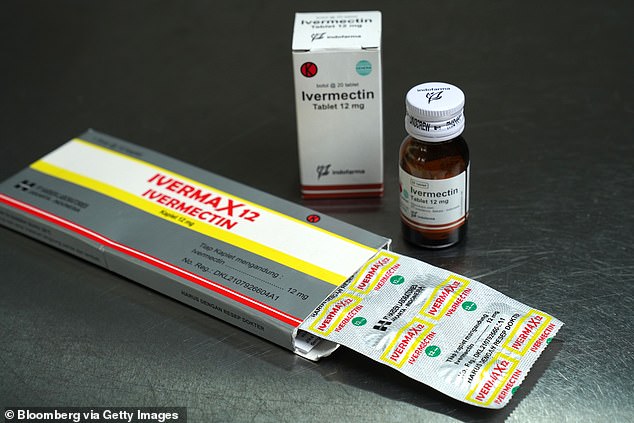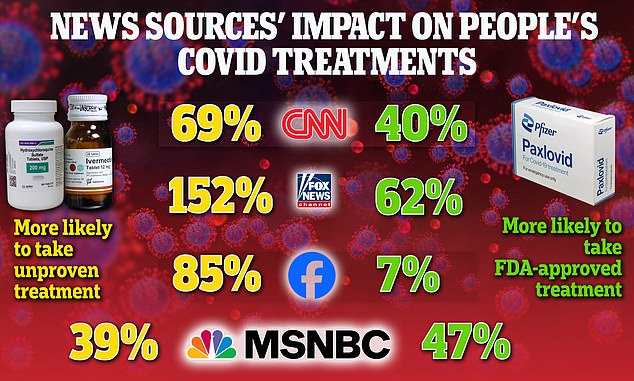One in 20 Americans treated their Covid with unfounded drugs – and certain news sites may have had something to do with it, survey finds
- Ivermectin and hydroxychloroquine were used by some to treat Covid
- But there is no evidence that either is effective against the virus
- READ MORE: Get ready for Covid vaccine PILLS!
About one in twenty Americans turned to unproven treatments such as ivermectin or hydroxychloroquine to treat their Covid-19 infection.
A national survey found that six percent of respondents reported using either treatment when they had the virus, despite the lack of evidence that these drugs effectively fight Covid.
Ivermectin is used in humans to treat parasitic worm infestations, head lice and rosacea. It was initially touted as a miracle cure because numerous studies suggested it could beat the virus, but experts criticized the studies as deeply flawed and unreliable and they insist there is not enough evidence to say ivermectin has any benefit.
Hydroxychloroquine is used to treat autoimmune diseases and can also be used as an antimalarial.
It was briefly approved by the Food and Drug Administration (FDA) to treat Covid, but approval was withdrawn a few months later after clinical trials showed the drug was unlikely to be effective against the virus and caused serious side effects.
Ivermectin is used in humans to treat parasitic worm infestations, head lice and rosacea. It was initially touted as a miracle cure because numerous studies suggested it could defeat the virus

Hydroxychloroquine is used to treat autoimmune diseases and can also be used as an antimalarial

Americans who said they turned to Facebook, CNN and Fox News for information were more likely to use non-evidence-based treatments for Covid, study found
As part of the study, researchers looked at where people got their news and information from and whether this had any effect on the chances of them using unproven medical treatments for Covid.
It found that people who endorsed even one misinformation about vaccines, 23 percent of participants, were “significantly more likely” to have used a non-evidence-based treatment.
Researchers also found a link between where respondents got their news and whether they turned to unproven treatments.
Americans who said they turned to Facebook, CNN, Fox News and MSNBC for information were more likely to use non-evidence-based treatments for Covid, the study found.
Researchers said: ‘Overall, cable news sources, regardless of perspective, were associated with increased odds for both non-evidence-based (treatments) and FDA-approved antiviral (treatments).
“Facebook did not follow this pattern: the likelihood of non-evidence-based (treatments) but not FDA-approved treatments was significantly higher with Facebook as a news source.”
When it came to political affiliation, conservatives were more likely than liberals to endorse unwarranted drugs such as ivermectin and hydroxychloroquine.
People who were also more likely to try the unproven drugs included those who said they trusted social media, those who scored higher on the American Conspiracy Thinking Scale, and people who said they trusted former President Trump.
Other factors indicating increased support for these treatments included exposure to vaccine misinformation and distrust in healthcare institutions.
For the study, researchers from Harvard Medical School and Northeastern University in Boston, Massachusetts, surveyed 13,438 Americans in all 50 states who said they had previously had Covid.
The participants had an average age of 43 years and the majority were women.
They were asked if they used ivermectin or hydroxychloroquine to treat Covid, whether they believed it false statements regarding the Covid vaccination, their trust in various institutions, their conspiratorial thinking and their news sources.
The research was published in JAMA Health Forum on Friday.
